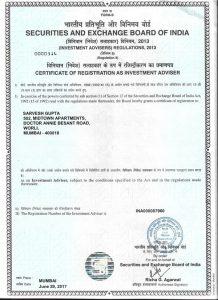PMS vs MF – Some points (Please note that by PMS I mean PMS as well as AIF and SEBI registered investment advisors here)
- Since PMS is lightly regulated, it is possible to create a portfolio highly different from benchmark and hence deliver an alpha far superior to a MF. However this is a theory, it cuts both ways. A great/very good equity fund manager can hence deliver a much higher return in a PMS set up compared to when the same fund manager operates in an MF setup because his hands are tied up much less. For instance, an MF will normally have 30-40 stocks in a portfolio while it is not uncommon for PMS to just have 15-20 stocks in the portfolio. However, at the same time, an average/poor quality equity fund manager will produce returns much lesser than an MF guy as he will concentrate and towards small caps in general – where mistakes can be far more costly.
- At the same time, the performance data for a MF is much more reliable than a PMS (as explained in my post above)
- In general, PMS are oriented much more towards small caps, because most investors have exposure to large caps through MF already. This means in rising markets, like what we witnessed in the last 3-4 years you will see PMS firms outperforming MF and vice-versa. This is because small caps tend to outperform general market in a rising market situation and vice-versa. However, please note that a small minority of PMS fund managers will outperform in all conditions just like Warren Buffett – these are the really talented and risk-averse managers with the right incentives.
- So what should investors look for in a PMS manager. Well I would look at few things – a) risk averse mindset – this can be checked by calculating the weighted average portfolio price to book and price to earnings and comparing it to the normal market. This can be especially helpful since it is difficult for an investor to figure our individual stock proxy but the overall valuation of the portfolio will give some sense of how it will perform in falling markets. Lower the better. b) alignment of interest – where has the manager invested his own money, how much money he makes as a fixed salary, how much is the fixed part of the fees and how much is profit share. Higher the profit share and lower the fixed fees and salary, the better. c) how much of the PMS manager own money is invested in the funds being manager. What is his % of networth d) Pedigree – does he come from the high pedigree and can he do his own independent valuation rather than relying on already compromised sell side research. Can he do some primary research and figure out the truth hidden behind the numbers. and e) Size – what is the size of money he is managing – higher the size lower the returns, most PMS firms become or will become victim of their own size as their performance will not be replicable once they are well known in the market and have a lot of funds to invest – particularly at the top of cycle.
- When Warren Buffett started his partnership days, he really complied with each of these requirements. a) he was a value investor and very frequently he sold positions when they reached 50-80% over his purchase price because then technically they became fairly valued. So his overall portfolio valuation metrics were low at all times compared to markets and other managers portfolios. b) & c) 99% of his networth was invested in the stocks he recommended for his investors, he took no fixed salary and only relied on profit share and d) he already had the right pedigree of managing his own money, reading extensively into sectors like insurance and retail where he made a lot of investments and he had already attended classes as well as worked for Graham – the father of value investing and e) he dissolved all the partnerships after a decade of track-record and once he reached a stage where he can no longer expect similar performance as past.
- Unfortunately, while these days, hardly very few people are following Buffett’s path – but if you are able to find a match in few respects, one can think about investing money with that manager seriously.
- I know all this takes time and effort and if one is not willing to spend it, best way to earn decent returns for the really long term is to take exposure to ETFs (which is what Buffett has also recommended for many).

